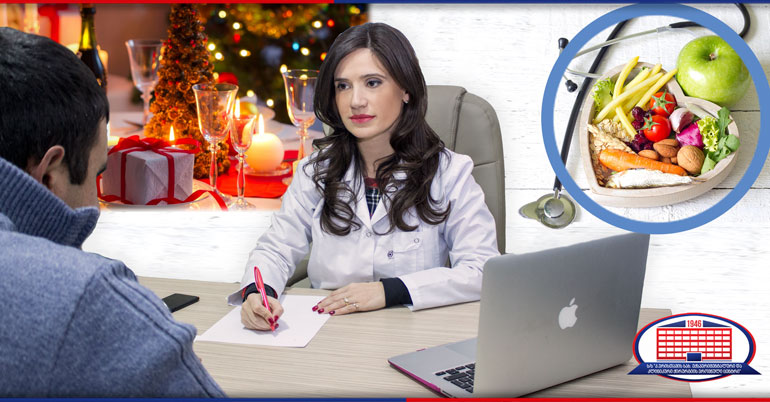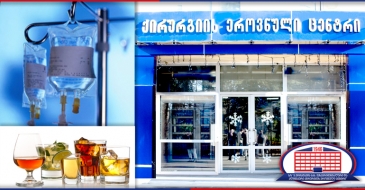
Diabetes mellitus is a disease characterized by chronic hyperglycemia or increased blood glucose concentration.
In order to maintain the level of glucose in normal ranges, the diabetic patients should follow the specific diet as well as therapies using tablets and insulin.
Diabetic patients are not permitted to consume fast digesting carbohydrates. The menu should be varied but with small amounts of carbohydrates (low in calories).
What should people with diabetes eat on New Year's dinner and what kind of products are allowed on the table. Sopio Puturidze, an endocrinologist at the National Center of Surgery, is talking about this issue.
Fruit
As Dr. Sophie said in an interview, during diabetes, people can eat citrus, kiwi and apple twice a day, 2 or 2.5 hours after having a meal. Banana - a half per meal. Grapes, persimmon, cherry, mulberry, and figs are not allowed.
Vegetables
Dr. Sophie explains that following vegetables are recommended for you: cucumbers, tomatoes, eggplant, cabbage, and herbs. These vegetables contain a few carbohydrates, but it is still desirable to maintain a balance. You should not eat carrots, beets, potatoes, beans, peas.
Mineral water, sweet drink, alcohol, fruit juice, compote
"You can drink mineral water. Alcohol, fruit juice, sweet and carbonated drinks are not recommended for your health, "says Dr. Sophie. Drink water 2 liters a day.
Meat
Endocrinologist of our clinic recommends that you eat boiled meat, beef, chicken and turkey. Pork and sheep are absolutely prohibited. Additionally, it is recommended to eat boiled meat at the dinner as a main dish.
Salads prepared with mayonnaise
According to our respondent's recommendation, you can eat salads prepared with mayonnaise once a day but in a limited amount. However, it should not contain potatoes and legumes. A salad with these ingredients is not allowed!
Sweets (biscuits, chocolate, candy)
According to the endocrinologist of our clinic, any type of sweet product is harmful for people suffering from diabetes, but in the festive days when the table is full with a variety of dishes and therefore temptation is increased, diabetic sweets are recommended, but in a very small amount!
Churchkhela, Gozinaki, Satsivi, "Khaladetsi"
Diabetic patients should not eat Churchkhela, Gozinaki and khaladetsi. The walnut sauce (Bage) is allowed. Satsivi within reasonable limits. All cereals contain a lot of carbohydrates and therefore you should have 8 tablespoons of Gomi per meal. As for the Mchadi - it is recommended to have 1 small Mchadi (50 grams) per meal.
Pkhali
Dr. Sophie says that Pkhali is allowed to eat and you can enjoy it with walnuts.
Fish
According to an endocrinologist, boiled fish is beneficial.
Milk products
Dr. Sophie says that a person with diabetes may eat cheese (preferably cheese, which has a small amount of salt) sugarless cottage cheese and Matsoni.
Sauces, pickles
Sauces are allowed in small quantities. The amount of pickles allowed is not more than 200 grams per day. If you are suffering from hypertension, give preference to the pickle with less dose of salt.
Pizza, Imeruli khachapuri, Lobiani
"Lobiani is categorically forbidden. Daily only a single piece of Imeruli khachapuri or pizza is allowed. However, keep in mind that the pizza and Imeruli khachapuri are not allowed at the same time. You can eat either a piece of pizza or the Imeruli khachapuri. I would like to explain to the reader that when the issue concerns diabetes, the dough products are completely restricted. You should buy only diabetic bread. But only 50 to 100 grams of diabetic bread is allowed per meal. I wish you a happy new year, good health, longevity and well-being! "- said the endocrinologist.
National Center of Surgery address – Tbilisi, Digomi Chachava street N5.
You can contact the Call-center of the National Center of Surgery at 577 11 91 19;
If you have some questions, you can contact the endocrinologist Sopio Puturidze, at 593 25 11 55








